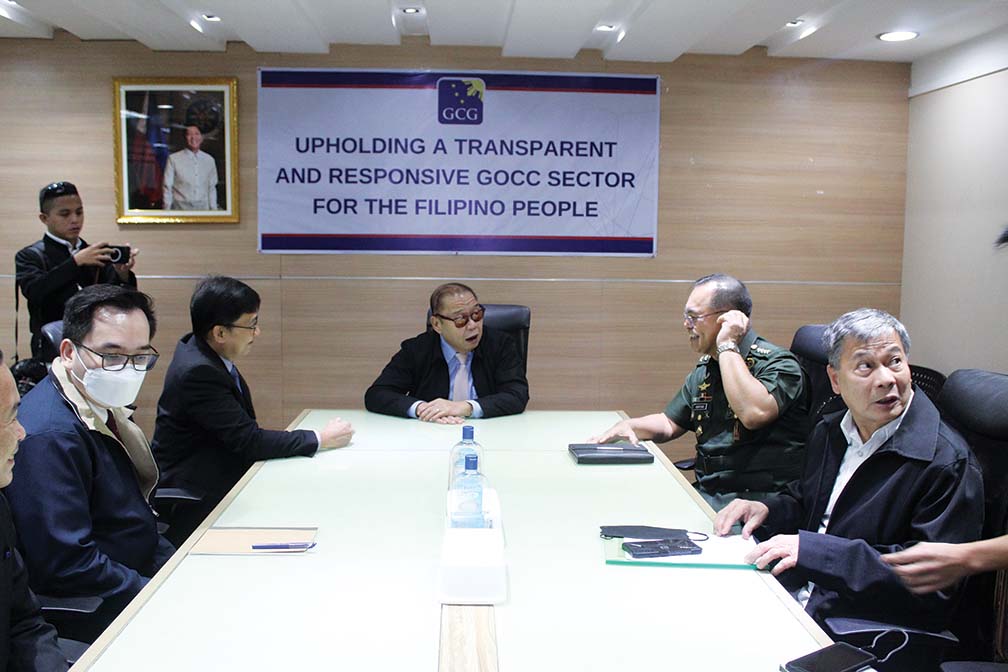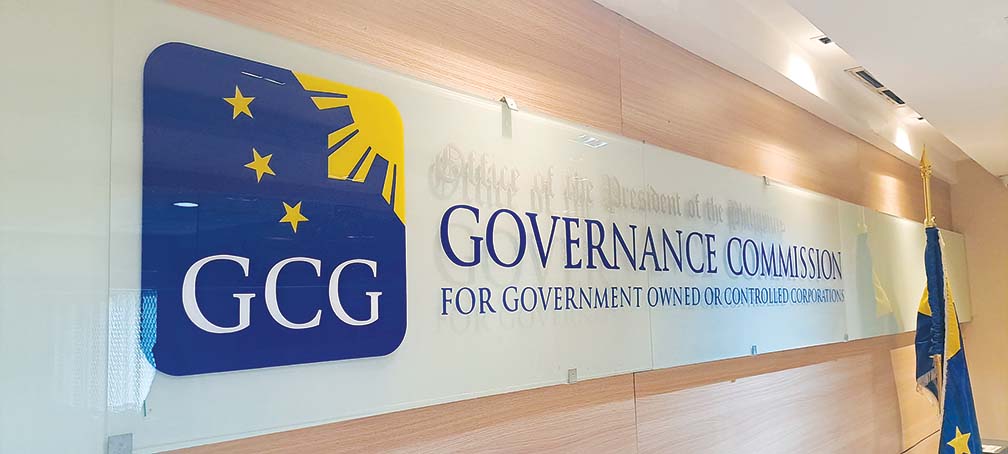Created on June 6, 2011 under Republic Act (RA) 10149, also known as the “GOCC Governance Act of 2011,” the GCG serves as the central policy-making and regulatory body mandated to safeguard the State’s ownership rights of GOCCs.
Essentially, the GCG ensures that the operations of GOCCs are transparent and responsible insofar as the needs of the public are concerned.
ROLE IN NAT’L DEV’T
GOCCs generally refer to corporate entities—engaging in non-commercial and commercial activities—where at least a majority of the outstanding capital stock is owned by the government
On Feb. 4, 1986, the late Pres. Ferdinand E. Marcos signed Presidential Decree (PD) 2029 which defined GOCCs and identified their role in national development.

As stated in PD 2029, “a government-owned or controlled corporation is a stock or a non-stock corporation, whether performing governmental or proprietary functions, which is directly chartered by a special law or if organized under the general corporation law is owned or controlled by the government directly, or indirectly.”
Under the decree, “government corporations shall be provided with adequate operational flexibility in order to function properly and efficiently, especially under conditions of market competition. Such flexibility shall nevertheless be consistent with the requirements of public accountability.”
Operational flexibility is defined as the ability of a GOCC to act promptly on its own individual transactions or matters, without need for further clearance from a supervisory authority external to the corporation, provided such actions are within the purview of their respective charters, explicit general policies, programs, and guidelines, including budgetary constraints provided by external supervising authorities.
MAKING OF THE GCG
On Jan 26, 2011, then Senator Francis Drilon delivered a sponsorship speech on Senate Bill 2640, a legislative measure that would lead to the passage of the GOCC Governance Act (RA 10149).
In his introduction, Drilon articulated that “since the 1970s, the Philippine Government has been establishing Government-Owned and -Controlled Corporations, or GOCCs, to accomplish development objectives, particularly economic and social services, and infrastructure development. Many of these GOCCs took on a life of their own, and pursued objectives independently of any government policy. A number of them are plagued by incompetence and corruption, becoming a burden and a drain on our meager public resources.”
Drilon stressed the need for regulating GOCCs since “many of them operate like independent republics. Some of them have burdened this Government with tons of indebtedness, with the National Food Authority’s P177 B debt on top of the list. Others, like the Metropolitan Waterworks and Sewerage System, have awarded themselves with so many bonuses that they have run out of the alphabet in labeling these bonuses.”
“A public office is a public trust. The need has never been more apparent than now to address the issue of such excessive and unwarranted monetary remuneration including benefits and perks accruing to the Board of Directors and top officials of GOCCs. We must exact transparency and accountability from our public officials, who have not faithfully discharged their duties as managers of public enterprises designed to contribute to national progress,” Drilon said.
In effect, the GOCC Governance Act rationalizes the structure, existence and operations of the GOCCs. The law is designed to reform the government corporate sector, improve corporate governance of GOCCs, and exact from them efficient and effective public service.
As of 2022, the total number of GOCCs in the country was 118. GOCCs receive subsidies and pay dividends to the national government.
POWERS & FUNCTIONS

It can be said that as per law, the GCG is a very powerful regulator of GOCCs. It has the power to assess and classify a GOCC’s relevance in order to ascertain whether it needs to be reorganized, merged, streamlined, abolished, or privatized, in consultation with the department or agency to which the GOCC is attached.
Evaluation outcomes are based on the following parameters—
- Relevance of the functions and purposes of the GOCC insofar as the national development policy of the state is concerned;
- Duplication or unnecessary overlap with functions, programs, activities, or projects already provided by a government agency;
- Being unable to produce the desired outcomes, objectives, and purposes for which the GOCC was originally designed or implemented;
- Becoming dormant or non-operational;
- Involvement in an activity best carried out by the private sector; and
- Consolidation of the function, purpose, or nature of operations of any group of GOCCs under a holding company.
The GCG can implement the reorganization, merger or streamlining of the GOCC, unless otherwise directed by the President.
It can recommend to the President the abolition or privatization of the GOCC, and upon the approval of the President, implement the abolition or privatization, unless the President designates another agency to do it.
The GCG oversees the selection and nomination of a GOCC’s directors and/or trustees and maintains the quality of Board Governance.
Through its Fit-and-Proper-Rule standard—a major policy reform it implemented in 2011—the GCG determines whether a person is fit and proper to be appointed to a GOCC governing board. This standard includes, but is not limited to, integrity, experience, education, training, and competence.
The GCG can likewise conduct compensation studies, develop and recommend to the President a competitive compensation and remuneration system which shall attract and retain talent, at the same time allowing the GOCC to be financially sound and sustainable.


